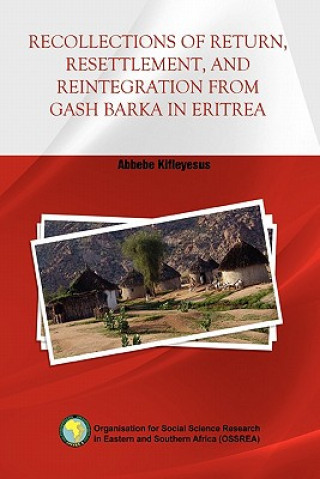
Kód: 09019856
Recollections of Return, Resettlement, and Reintegration from Gash Barka in Eritrea
Autor Abbebe Kifleyesus
At the beginning of the 1990s, the end of the Eritrea-Ethiopia war resulted in the repatriation of some 70,000 Eritreans from the Sudan. It soon became clear that the movement of such a huge influx of refugees had its own momentum ... celý popis
- Jazyk:
 Angličtina
Angličtina - Vazba: Brožovaná
- Počet stran: 302
Nakladatelství: OSSREA, 2010
- Více informací o knize

Mohlo by se vám také líbit
-

Dune
216 Kč -

Haunting Adeline
621 Kč -

Berserk Deluxe Volume 2
1092 Kč -

White Nights
89 Kč -

Powerless
268 Kč -

Atomic Habits
330 Kč -

Dune Messiah
228 Kč -

Berserk Deluxe Volume 3
1142 Kč -

One Day
221 Kč -

Berserk Deluxe Volume 1
1115 Kč -

Iron Flame
368 Kč -

Surrounded by Idiots
213 Kč -

Harry Potter and the Prisoner of Azkaban (Minalima Edition)
993 Kč -

Gravity Falls Journal 3
443 Kč -

Heaven Official's Blessing: Tian Guan Ci Fu (Novel) Vol. 1
420 Kč -

The Creative Act
568 Kč -

Dune
276 Kč -

Hunting Adeline
624 Kč -

A Little Life
290 Kč -

Children of Dune
230 Kč -

Heaven Official's Blessing: Tian Guan Ci Fu (Novel) Vol. 2
427 Kč
Informovat o naskladnění knihy
Zadejte do formuláře e-mailovou adresu a jakmile knihu naskladníme, zašleme vám o tom zprávu. Pohlídáme vše za vás.
Více informací o knize Recollections of Return, Resettlement, and Reintegration from Gash Barka in Eritrea
 Anotace knihy
Anotace knihy
At the beginning of the 1990s, the end of the Eritrea-Ethiopia war resulted in the repatriation of some 70,000 Eritreans from the Sudan. It soon became clear that the movement of such a huge influx of refugees had its own momentum. This momentum engendered closer academic research. Along with the initial enthusiasm for a nation, there were also high hopes amongst many academics and policymakers that Eritrean refugee cycles might come to an end for many. These hopes for a conducive environment for repatriation of Eritrean refugees appear to be well-founded because between 1990 and 1998, more than 350,000 refugees were repatriated to their country where policies to assist repatriation have been linked to attempts to support economic reconstruction, although not always successfully. The increased and accelerated rates of repatriation from the Sudan lend legitimacy to the discourse that repatriation is the optimum, most durable and feasible solution to the refugee crisis from Eritrea. Yet, there was the need to understand the priorities of the refugees in exile, for some of whom repatriation may not have been a desired outcome and for whom 'home' has come to mean something quite different from the meaning often ascribed by policymakers. Even where return has occurred, there was a need to pay much closer attention to relations after return, and to recognise that even if repatriation is the end of one cycle, it is also usually the start of a new cycle which can challenge and expose some returnees to vulnerability. This study addresses repatriation and reintegration and how they affect both the stayee communities to which refugees are repatriated as well as the returnees themselves. Of particular importance to this study is what connects or reconnects Eritrean refugees to their communities of origin in Gash Barka as they contemplated a possible or actual repatriation. Also significant are the social, economic, psycho-social and ecological conditions necessary for Eritrean refugees to decide to repatriate voluntarily or coercively or still to accept an assisted repatriation and when and on what basis they then decide to be repatriated. The study also considers what happens during resettlement and reintegration, not only to returnees but also to stayee societies in Gash Barka, and examines whether the notion that culture is rooted in particular geographic places implies that uprooted Eritrean refugees somehow have lost their culture.
 Parametry knihy
Parametry knihy
Zařazení knihy Knihy v angličtině Society & social sciences Society & culture: general Social issues & processes
- Plný název: Recollections of Return, Resettlement, and Reintegration from Gash Barka in Eritrea
- Autor: Abbebe Kifleyesus
- Jazyk:
 Angličtina
Angličtina - Vazba: Brožovaná
- Počet stran: 302
- EAN: 9789994455508
- ISBN: 9789994455508
- ID: 09019856
- Nakladatelství: OSSREA
- Hmotnost: 486 g
- Rozměry: 229 × 154 × 20 mm
- Datum vydání: 01. December 2010
Osobní odběr Praha, Brno a 12903 dalších
Copyright ©2008-24 nejlevnejsi-knihy.cz Všechna práva vyhrazenaSoukromíCookies



 Vrácení do měsíce
Vrácení do měsíce 571 999 099 (8-15.30h)
571 999 099 (8-15.30h)